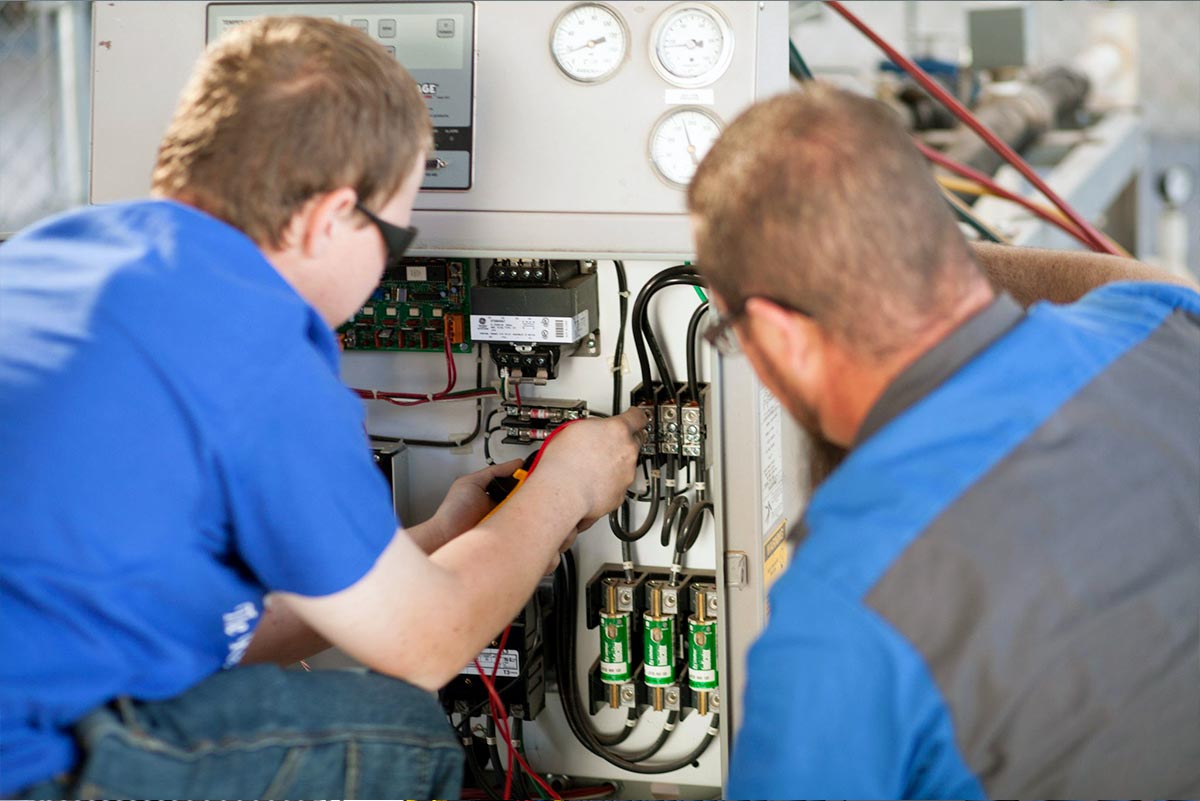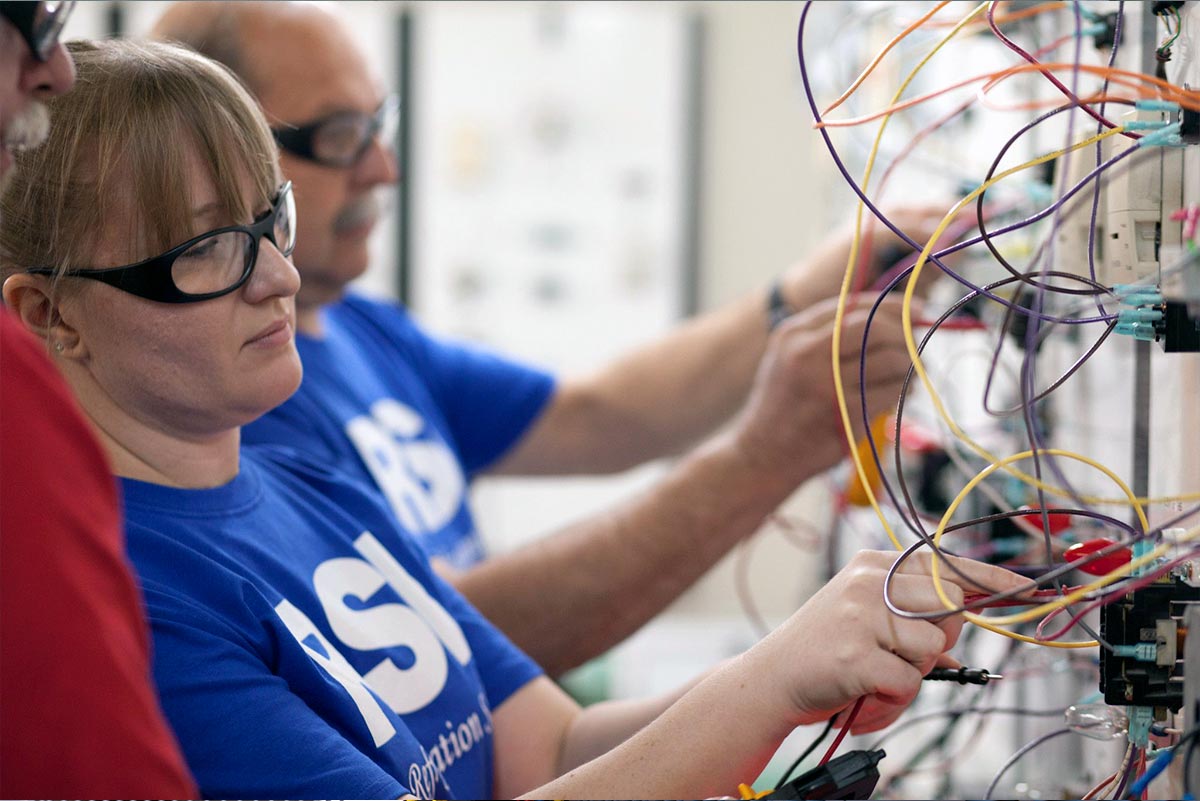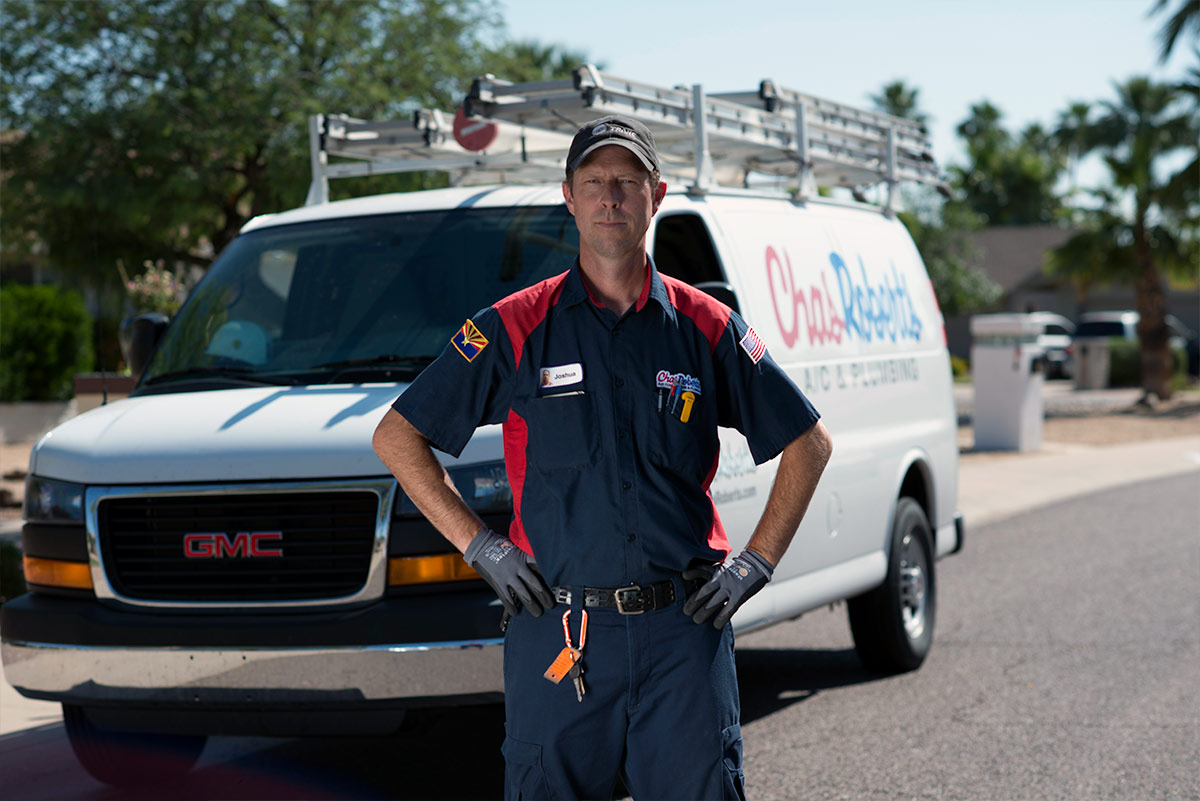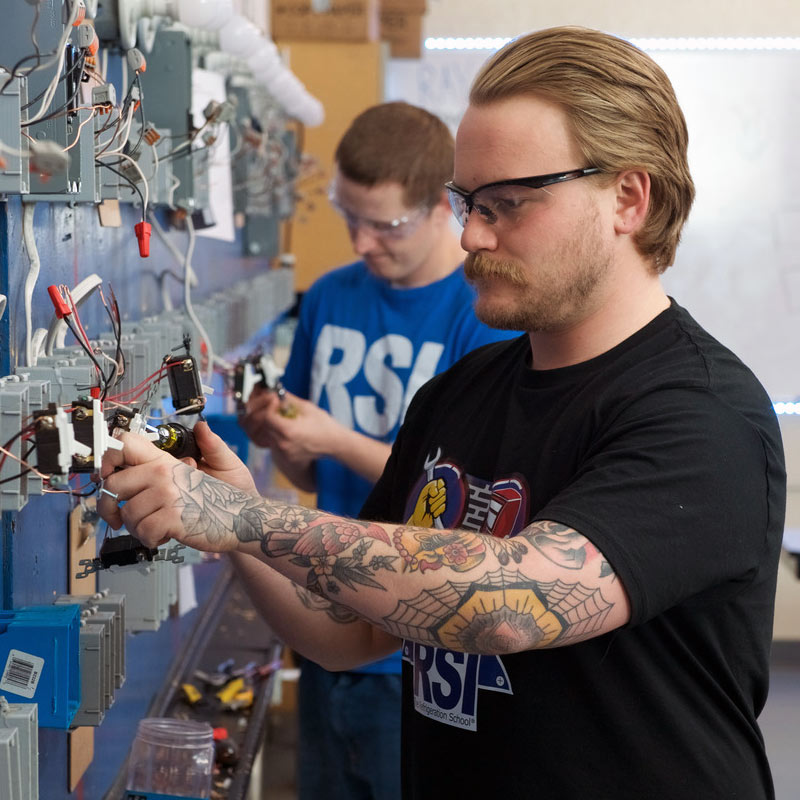Updated: 04/27/2023
Are you wondering how to become a refrigeration technician? Or, maybe you’ve already made up your mind to pursue a career in HVAC service and repair.
Either way, learning more about—or even enrolling in—an HVAC and refrigeration training program can be the next step. This is because the Bureau of Labor Statistics indicates that many employers would rather hire workers with formal HVAC training from a post-secondary institution, such as a trade school.1
The BLS also notes that such schools can prepare students for the EPA Section 608 Technician Certification test, a requirement for many HVAC and refrigeration professionals.1
Now you know HVAC training can be important, but you likely have questions like what is it, how long can it take and what could you do with your HVAC degree? Get answers to these common questions about HVAC training and more in this article.
SECTION 1
What Is HVAC Training?
Vocational Education
HVAC training is a type of vocational education. Unlike colleges and universities, which typically provide classroom instruction in the concepts and theories of subjects relevant to the student’s major, vocational education institutions offer training in the skills and practices necessary for a specific career.2
Vocational school students often are not required to take general education courses like English or social studies. Instead they learn only the skills necessary for the job. The learning style of vocational training tends to be more hands-on, with students spending the majority of time learning by doing instead of sitting in a classroom.2
Vocational Training Focuses and Occupations
Students seeking an alternative to college and the office jobs that path typically leads to can find a variety of options in vocational training.
Vocational Training Focuses
- Trade and industry
- Agriculture
- Technical education
- Business and office
- Home economics
- Health
- Marketing and distribution3
Vocational Occupations
Students can prepare for a host of occupations in a vocational training program:
- Tourism manager
- Auto mechanic
- Plumber
- HVAC technician
- Information technology worker
- Electrician2
- Emergency medical technician (EMT)
- Cosmetologist
- Medical assistant4
Vocational Program Duration and Award
If you earn a certificate from a vocational program, it could allow you to prepare for a career in a relatively short amount of time because many vocational certificate programs can take up to 2 years to complete, indicates the Bureau of Labor Statistics.

HVAC and Refrigeration Training Objective
The goal of HVAC and refrigeration training would be to prepare students for careers in heating, ventilation, air conditioning and refrigeration (HVAC/R) service and repair. Below are two important skillsets typically taught in HVAC/R programs:
- Mechanical Skills
Through a combination of hands-on training and classroom instruction, an HVACR program should teach students the mechanical skills to install and service complex climate-control systems, including the knowledge of HVACR components necessary to be able to disassemble, assemble and program them.1 - Troubleshooting Skills
Troubleshooting basic HVAC problems is another important skill students may learn in an HVAC and refrigeration program, as they could routinely be tasked with identifying problems in broken systems and determining the best solutions to them.1
HVAC and Refrigeration Training Programs and Courses
The HVAC courses you take and time to complete training can depend on the type of school and program in which you enroll. This is why it can be a good idea to research program offerings at different HVAC and refrigeration schools. Doing so may give you a better idea of what to expect when it comes to subjects learned and duration of training.
Below is an example of the HVACR programs and courses offered at The Refrigeration School (RSI), the largest HVAC/R school in the United States. Its campus in Phoenix, Arizona, offers 3 different programs that can prepare students for HVAC/R careers.
Refrigeration Technologies Program
The 6-month Refrigeration Technologies program consists of the following HVAC training courses:
- Fundamentals of Refrigeration
- Comfort Systems – Residential
- Comfort Systems – Commercial
- Fundamentals of Electricity
- Refrigeration Systems and Practices
- Advanced Troubleshooting Techniques
The program can prepare students for several different types of entry level positions in the field of HVAC and refrigeration service and repair:
- HVACR service technician
- Refrigeration service technician
- HVACR installation technician
- Low-temperature field technician
- Refrigeration installation technician
- Commercial refrigeration technician
- Restaurant and retail refrigeration technician
Electro-Mechanical Technologies Program
This 9-month program combines HVAC/R training with instruction in electrical and mechanical technologies. As the BLS notes, some HVACR technicians specialize in solar panel installation, maintenance, repair and replacement.5
The Electro-Mechanical Technologies program can prepare students for careers with an electrical and/or maintenance focus. In addition to the HVAC training courses offered in the Refrigeration Technologies program, students also take the following courses:
- Fundamentals of Solar
- Electrical Wiring – Commercial
- Electrical Wiring – Residential
A diverse array of entry level career options may be possible upon completion of this HVACR and electro-mechanical technologies training program:
- Boiler operator
- Maintenance electrician
- Facilities maintenance engineer/technician
- HVACR technician
- Power plant field technician
Associate of Occupational Studies in Mechanical Maintenance Engineering
Students interested in working in commercial refrigeration, industrial refrigeration and other settings requiring the maintenance and service of large, complex HVAC/R equipment may benefit from the 15-month Associate of Occupational Studies in Mechanical Maintenance Engineering.
In addition to the HVACR, electro-mechanical and solar courses offered in the Electro- Mechanical Technologies program, students take the following courses:
- Chillers
- Basic College Mathematics
- Cooling Towers and Maintenance o English Composition
- Transformers and Technical Math
- Principles and Applications of Air
- Predictive Maintenance and Piping Systems o Motors and Applications
- Fundamentals of Boilers
- Entrepreneurship
- Boilers and Boiler Systems
- Computer Applications and Decision Making o Preventative Maintenance and Planning
These courses are designed to prepare students for entry-level positions in commercial and industrial HVACR and facilities maintenance. Below are some of the specific positions they may be able to pursue with their training:
- Facilities maintenance
- Boiler operator
- Engineer/technician
- Maintenance electrician
- HVACR service technician
- HVACR installation technician
- Refrigeration service technician
- Low-temperature field technician
- Powerplant field technician
- Restaurant and retail refrigeration technician
- Commercial refrigeration technician

SECTION 2
Types of HVAC and Refrigeration Training
As you can see from the sampling of programs above, HVAC and refrigeration training typically focuses on teaching students how to work on the types of equipment they would encounter in the field.
Add different types of systems, such as solar panel assemblies, or larger, more sophisticated units, such as those found in factories, and the training would likely include additional coursework.
The following subjects, however, are typically covered in an HVAC and refrigeration training program:
Fundamentals of HVAC/R
- Intro to HVACR equipment
- Becoming an HVAC technician
- HVAC safety
- HVAC tools
- HVAC measurements6
HVAC/R Science
- Properties of matter
- Types of energy and their properties
- Science of refrigeration and thermodynamics
- Temperature measurement and conversion
- Pressure and vacuum
- HVACR tool calibration6
Refrigeration Systems and Components
- Types of refrigeration systems
- The refrigeration cycle
- Condensers
- Compressors
- Metering devices
- Evaporators
- Refrigerants and their properties
- Mapping the refrigeration cycle6
Refrigeration Practices
- Refrigeration safety
- Refrigeration system testing and servicing equipment
- Tubing and piping
- Brazing and soldering
- Refrigerant system piping
- Accessing sealed refrigeration systems
- The Types of refrigeration systems
- Refrigerant evacuation
- Refrigerant leak testing
- Refrigerant system charging6
HVAC/R Electrical Systems and Parts
- Electrical safety
- Basic electricity
- Alternating current fundamentals
- Electrical testing and measuring instruments
- Electrical components
- Electrical motors
- Electrical diagrams
- Control systems
- Communicating control systems6
Air Conditioning Systems
- Fundamentals of psychrometrics and airflow
- Air filters
- Ventilation and dehumidification
- Residential air conditioning
- Residential split-system air-conditioning installations
- Duct installation
- Troubleshooting air-conditioning systems6
Heating Systems
- Principles of combustion and safety
- Gas furnaces
- Gas furnace controls
- Gas furnace installation
- Troubleshooting gas furnaces
- Oil-fired heating systems
- Oil furnace maintenance
- Boiler service
- Residential oil heating installation
- Troubleshooting oil heating systems o Space heaters
- Humidifiers6
Other subjects students of an HVAC and refrigeration training program may study include:
- Heat pump systems
- System design
- Sizing and layout
- Commercial environment systems
- Commercial refrigeration systems
- Installation, maintenance, service and troubleshooting6
SECTION 3
What Can You Do with an HVAC Certificate?
Formal HVAC training at a post-secondary institution, such as a trade school, can improve job opportunities because employers typically value this credential, hiring workers with it over those with only a high school diploma or GED.
Trade schools and other vocational training schools typically award a diploma or certificate, which demonstrates to employers that the technician has completed the training program.
As the BLS reports, some HVAC schools design their training programs to prepare technicians to take the EPA Section 608 Technician Certification test, which is necessary for any technician who handles refrigerants.1
Consequently, a variety of different types of HVAC careers and jobs may be available to those with the necessary HVAC and refrigeration training, certifications and licenses. Below are some of the specific positions that may be possible:
- A/C tech
- HVAC installer
- HVAC mechanic
- HVAC service tech
- HVAC service technician
- HVAC specialist
- HVAC technician
- Service technician
- Systems mechanic7
- Commercial refrigeration technician
- Industrial refrigeration technician

SECTION 4
HVAC Career Facts and Stats
Now you know some of the specific types of positions you might be able to land after completing HVACR training, but what about some general information about the career? Check out the HVAC technician career overview below for some quick facts and statistics.
-
HVAC Technician Job Description
The primary job of HVAC technicians is to service and repair heating, ventilation, air conditioning and refrigeration systems.5
-
HVAC Technician Job Growth
The BLS predicts 4% job growth in the U.S. for HVAC technicians through 2029. This is as fast as average for all occupations.8*
-
HVAC Technician Education Requirements
Employers generally prefer to hire HVAC technicians with formal training from a post- secondary institution, such as a trade school. EPA Section 608 Technician Certification is necessary for technicians who work with refrigerants2
-
HVAC Technician Salary
According to the BLS as of May 2020, HVAC technicians in Phoenix made an annual mean salary of $50,070, which comes out to $24.07 an hour.8**
SECTION 5
Is It Worth Going to School for HVAC?
Completing an HVAC and refrigeration training program can offer many benefits:
- Improved job prospects.1
- Preparation for the tests necessary to earn HVAC certifications and licenses.1
- Better pay.9**
- Opportunities for career advancement.
- Networking with industry experienced instructors.
- Meeting other future HVAC technicians and forming lifelong friendships.
SECTION 6
Train to Become an HVACR Technician
Want to learn more about training to become an HVACR technician or ready to enroll? Contact The Refrigeration School today to request more information or get started. Call 888-671-5803.
* According to BLS data Arizona employed 10,000 Heating, Air Conditioning, and Refrigeration Mechanics and Installers (499021) through May 2020 http://data.bls.gov/oes.
** Phoenix Area’s annual mean wage is $50,070 and $24.07 hourly for Heating, Air Conditioning, and Refrigeration Mechanics and Installers (499021) reported by BLS as of May 2020 http://data.bls.gov/oes. Average starting salary for Refrigeration Technologies is $35,670 for RSI graduates employed during the 12 month period of 7/1/18-6/30/19.

Have Questions?
A team of advisors is available to answer questions you may have.
M – Th: 7AM – 7:30PM (PST)
F: 7AM – 4PM (PST)
Sat: 8AM – 12PM (PST)
Additional Sources
1 https://www.bls.gov/ooh/installation-maintenance-and-repair/heating-air-conditioning-and-refrigeration-mechanics-and-installers.htm#tab-4
2 https://study.com/vocational_training.html
3 https://nces.ed.gov/pubs/web/95024-2.asp
4 https://www.bls.gov/careeroutlook/2015/article/career-planning-for-high-schoolers.htm
5 https://www.bls.gov/ooh/installation-maintenance-and-repair/heating-air-conditioning-and-refrigeration-mechanics-and-installers.htm#tab-2
6 Title: Fundamentals of HVAC; Authors: Carter Stanfield and David Skaves; Air-Conditioning, Heating, and Refrigeration Institute; Second Edition; Textbook page Xiii-Xiv
7 https://www.onetonline.org/link/summary/49-9021.01
8 https://www.bls.gov/ooh/installation-maintenance-and-repair/heating-air-conditioning-and-refrigeration-mechanics-and-installers.htm#tab-1
9 https://www.bls.gov/careeroutlook/2015/article/wage-differences.htm

